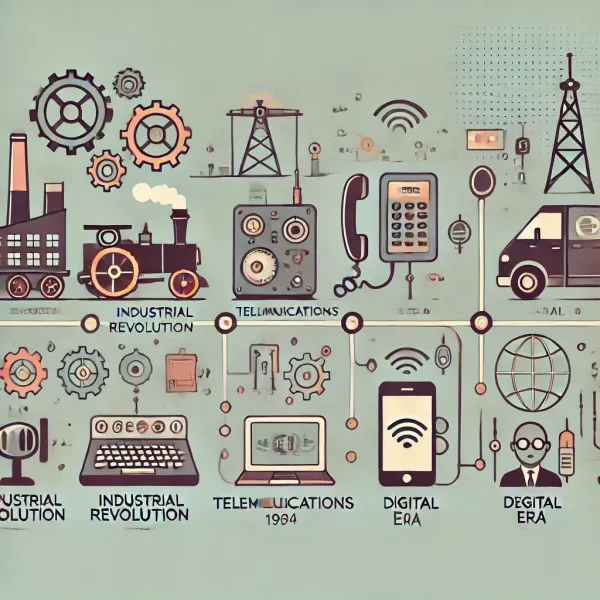
The correlation between technological advancement and societal evolution represents a complex system of interdependent variables that continually reshape human civilization. This analysis examines the empirical evidence of technology's impact on sociological frameworks, economic systems, and cultural paradigms across different temporal phases, while providing quantitative and qualitative insights into future technological trajectories.
Historical Technological Paradigms
Industrial Mechanization Framework
The Industrial Revolution instituted fundamental systemic changes through the implementation of:
- Mechanized production systems
- Steam-powered locomotion infrastructure
- Agricultural automation protocols
- Urban development matrices
- Labor force restructuring mechanisms
Communications Infrastructure Evolution
The progression of telecommunications technologies has systematically reduced spatial-temporal boundaries through:
- Electrical signal transmission systems (telegraph/telephone)
- Electromagnetic broadcast networks
- TCP/IP-based digital communications
- Social network infrastructure platforms
Contemporary Digital Infrastructure
Digital Transformation Metrics
Current digital transformation protocols have implemented substantial modifications in:
- Distributed workforce management systems
- E-commerce infrastructure frameworks
- Digital learning management systems (LMS)
- Telemedicine deployment protocols
- Financial technology (FinTech) infrastructure
Artificial Intelligence Implementation
Contemporary AI frameworks are revolutionizing operational paradigms in:
- Enterprise resource planning (ERP) systems
- Natural Language Processing (NLP) applications
- Computer-aided diagnostic systems
- Autonomous vehicle control systems
- Smart home automation protocols
Social Media Architecture
Digital social frameworks have restructured:
- Interpersonal communication protocols
- Political discourse mechanisms
- Market penetration strategies
- Information dissemination systems
- Virtual community architectures
Prospective Technological Trajectories
Emerging Technology Frameworks
Several technological paradigms demonstrate significant potential for societal restructuring:
- Quantum computational systems
- Advanced robotics integration
- CRISPR and genetic modification protocols
- Extended reality (XR) implementations
- IoT ecosystem architectures
Projected Sociological Modifications
Anticipated systematic changes include:
- Workplace paradigm evolution
- Educational framework restructuring
- Healthcare delivery system optimization
- Urban infrastructure reconfiguration
- Environmental sustainability protocols
Critical Analysis of Systemic Challenges
Digital Access Disparity
- Infrastructure accessibility metrics
- Technical competency disparities
- Socioeconomic access variables
- Geographical distribution limitations
Data Security Architecture
- Data protection protocols
- Cybersecurity threat matrices
- Privacy framework implementation
- Digital surveillance systems
Ethical Framework Considerations
- AI decision-making protocols
- Workforce automation implications
- Genetic modification parameters
- Digital rights infrastructure
- Technology dependence metrics
Concluding Analysis
The technological determinism affecting societal evolution continues to demonstrate exponential growth patterns. Future development trajectories will require sophisticated balancing mechanisms between innovation protocols and ethical frameworks, while ensuring equitable distribution of technological resources. The optimization of human-technology interaction systems will be paramount in determining future sociological outcomes.
Comments